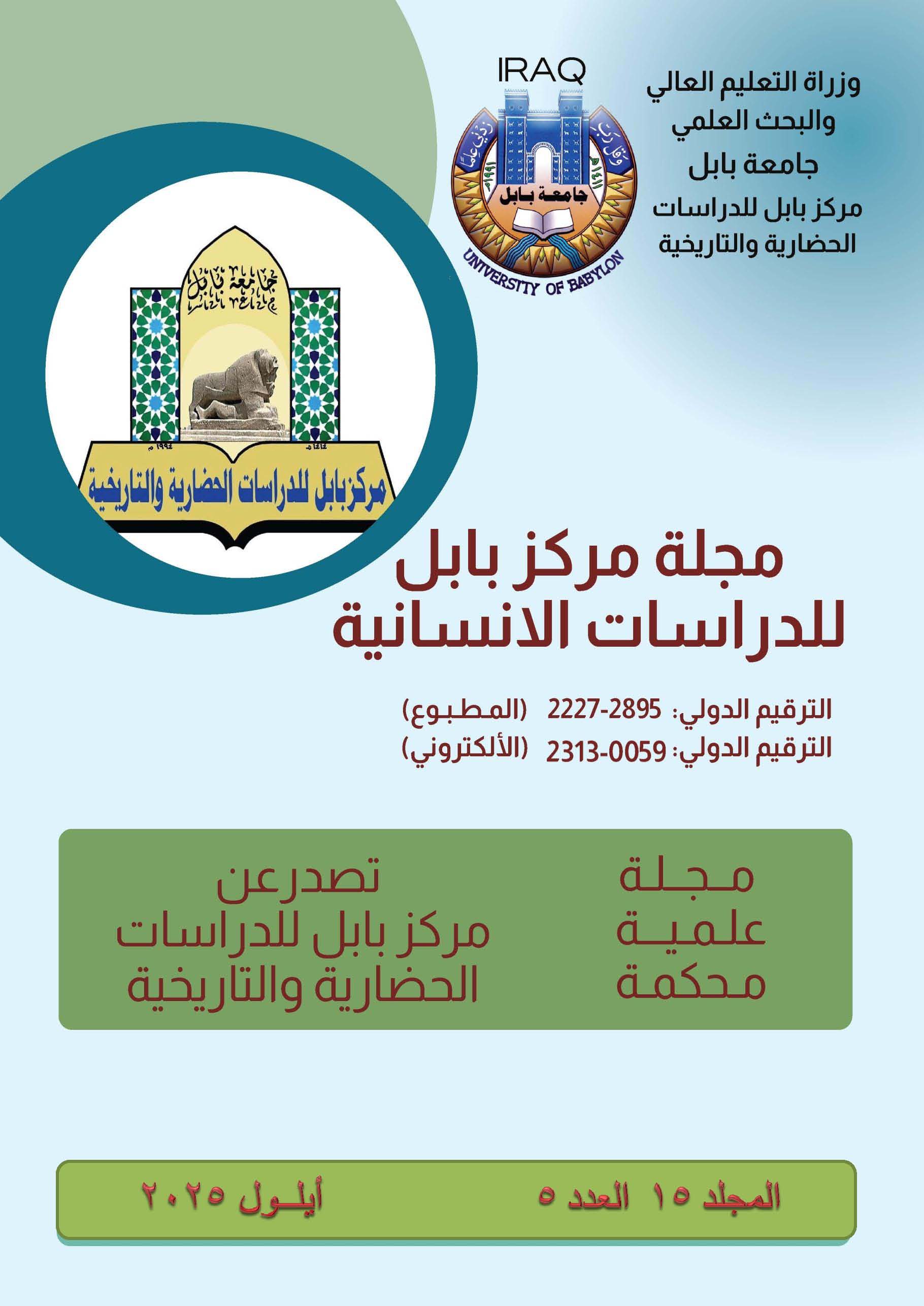Abstract
Although the nature of the speech in the worde of Imam Hussein () is an informing one; it is intended to create a communicative information between him() and the recipient. We can see from the fact based on informing that seek making a request, though not explicit since it has a perlocutionary (effective) act, which seeks to raise the interest of the recipient and influence him. Among the factors influencing the recipient to locate, in the discourse, the aesthetic means that increase its impact in the soul, driving it to follow it and being motivated by it. It is a literary, creative, moral and disciplinary speech at the same time. We recognize that the speaker has an influence the meaning he wants to convey to the addressee by asking for a range of means to achieve this. These methods are hinting features that the speaker uses to express his positions and the signs of his discourse. At the same time, he reveals the tendency to expose oneself and gain comfort by expressing ones feelings. This research traces these features in the Husseini discourse and analyzes them to reveal the beauty the language, and the effect on the recipient at the same time.
And these topics that the research examines, it appears that the language cannot be confined to the synthetic, use, or sophisticated structures mentioned by the linguists, and in other words, the research reveals that a language is a use whatever its form, as long as the linguistic community has accepted it and agreed to use it, then there is no meaning - then - for it to be limited to a usage without another, nor in a structure without another, as for the criterion of eloquence of speech Whether or not it remains a standard that reveals a grammatical opinion or a linguistic opinion in a specific linguistic environment, and within a certain historical stage as well, so in the general standard neither necessity nor a dialect is a dialect, but usage is the ruling.
And these topics that the research examines, it appears that the language cannot be confined to the synthetic, use, or sophisticated structures mentioned by the linguists, and in other words, the research reveals that a language is a use whatever its form, as long as the linguistic community has accepted it and agreed to use it, then there is no meaning - then - for it to be limited to a usage without another, nor in a structure without another, as for the criterion of eloquence of speech Whether or not it remains a standard that reveals a grammatical opinion or a linguistic opinion in a specific linguistic environment, and within a certain historical stage as well, so in the general standard neither necessity nor a dialect is a dialect, but usage is the ruling.
Keywords
Imam Hussein.Communicative Discourse. Satisfaction. Brief.
Abstract
وبالرغمِ من أن طبيعةَ الخطابِ في كلامِ الإمامِ الحسينِ(u) طبيعةٌ إخباريَّــةٌ؛ إذ القصدُ منه خلقُ تواصلٍ أخباريٍّ بينَه(u) وبينَ المتلقي، لكننا يمكنُ أنْ نلمسَ منه فعلاً قائمًا على الإخبارِ المرادُ منه الطلبِ وإن لم يكن تصريحًا بذلك، ذلك أنَّه يحملُ بينَ طيَّاتِه فعلاً تأثيريًّــا، يسعى إلى استثارةِ المتلقي والتأثير فيهِ، ومن عواملِ التأثير في المتلقي أن يُتحَرَّى في الخطابِ الوسائل الجماليةِ التي تزيد من وقعِه في النفسِ، وتدفعها إلى متابعتِه والانفعالِ به، فيكونُ خطابًا أدبيًّا خلاّقًا، وأخلاقيًّا تأديبيًّا في الوقتِ نفسِه، ولاشكَّ في أنَّنا ندركُ أنَّ للمتكلِّمِ أثرًا في إظهارِ المعاني التي يريدُ إيصالَها للمخاطَبِ من خلالِ توسّــلِه بمجموعةٍ من الوسائلِ لتحقيقِ ذلكَ، ولتكونَ هذه الوسائلُ ملمحًا أدائيًّا، يستعينُ بهِ المتكلّمِ ليعبّــرَ بها عن مواقفِه، ودلالاتِ خطابِه، وتكشفُ في الوقتِ نفسِه عن ميلِ الذاتِ إلى الرغبةِ في الترويحِ والتفريغِ عمَّا يختلجُ فيها من مشاعرَ إنسانيةٍ مختلفةٍ, والبحثُ يتتبَّعُ هذهِ الملامحِ في الخطابِ الحسيني ويحلِّلُها وصولاً إلى الكشفِ عمّا وراءَها من جمالٍ للغةِ، وفعلٍ مؤثّرٍ في المتلقّي في الوقتِ نفسِه.
وهذه المواضعُ التي تحرَّاها البحثُ، والتِي لا شكَّ في أَنَّها صادرةٌ عمَّن لا يُمكنُ أَنْ يُشَكَّ في فصاحتِه، ومقدارِ علمِه وبلاغتِه، تُظهرُ أنَّ اللغةَ لا يمكنُ أنْ تنحصرَ بالقوالبِ التركيبيةِ، أو الاستعمالية، أَو البُنى الصَّرفيةِ التي ذكرَها اللُّغويون، وجعلُوها مناطَ قياسِهم، وما سوى ذلكَ فهوَ لغةٌ أَو ضرورةٌ، وبمعنى آخر يكشفُ البحثُ عن أنَّ اللغةَ استعمالٌ مهما كانَ شكلُها، طالما أنَّ الجماعةَ اللغويةَ قد قبلتْ بها، وارتضَتِ استعمالَها، فلا معنى – إِذن - لأن تنحصرَ في استعمالٍ دونَ آخرَ، ولا في بنيةٍ دونَ أخرى، أمَّا معيارُ فصاحةِ الكلامِ من عدمِها فيبقى معيارًا يكشفُ عن رأيٍ نحويٍّ أو رأيٍ لُغويٍّ في بيئةٍ لغويةٍ معيَّنةٍ، وضمنَ مرحلةٍ تاريخيةٍ معيَّنةٍ أيضًا، لذا ففي المقياسِ العامِ لا الضرورةُ ضرورةٌ ولا اللهجةٌ لهجةٌ، إِنَّما الاستعمالُ هو الحاكمُ.
وهذه المواضعُ التي تحرَّاها البحثُ، والتِي لا شكَّ في أَنَّها صادرةٌ عمَّن لا يُمكنُ أَنْ يُشَكَّ في فصاحتِه، ومقدارِ علمِه وبلاغتِه، تُظهرُ أنَّ اللغةَ لا يمكنُ أنْ تنحصرَ بالقوالبِ التركيبيةِ، أو الاستعمالية، أَو البُنى الصَّرفيةِ التي ذكرَها اللُّغويون، وجعلُوها مناطَ قياسِهم، وما سوى ذلكَ فهوَ لغةٌ أَو ضرورةٌ، وبمعنى آخر يكشفُ البحثُ عن أنَّ اللغةَ استعمالٌ مهما كانَ شكلُها، طالما أنَّ الجماعةَ اللغويةَ قد قبلتْ بها، وارتضَتِ استعمالَها، فلا معنى – إِذن - لأن تنحصرَ في استعمالٍ دونَ آخرَ، ولا في بنيةٍ دونَ أخرى، أمَّا معيارُ فصاحةِ الكلامِ من عدمِها فيبقى معيارًا يكشفُ عن رأيٍ نحويٍّ أو رأيٍ لُغويٍّ في بيئةٍ لغويةٍ معيَّنةٍ، وضمنَ مرحلةٍ تاريخيةٍ معيَّنةٍ أيضًا، لذا ففي المقياسِ العامِ لا الضرورةُ ضرورةٌ ولا اللهجةٌ لهجةٌ، إِنَّما الاستعمالُ هو الحاكمُ.
Keywords
الإمام الحسين. الخطاب. التواصل. الإشباع. الاقتصاد اللغوي
